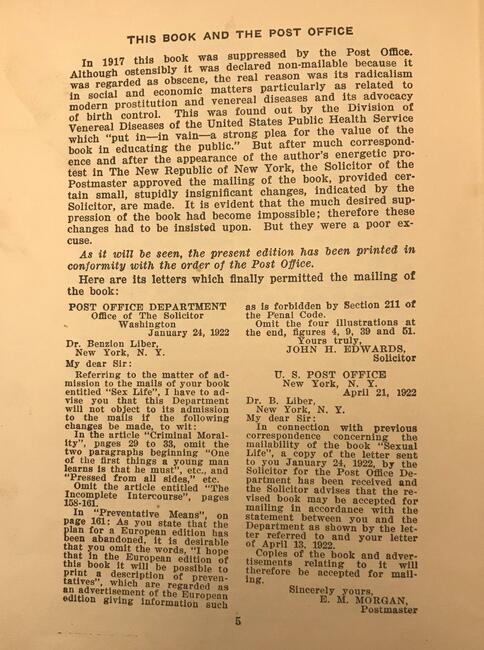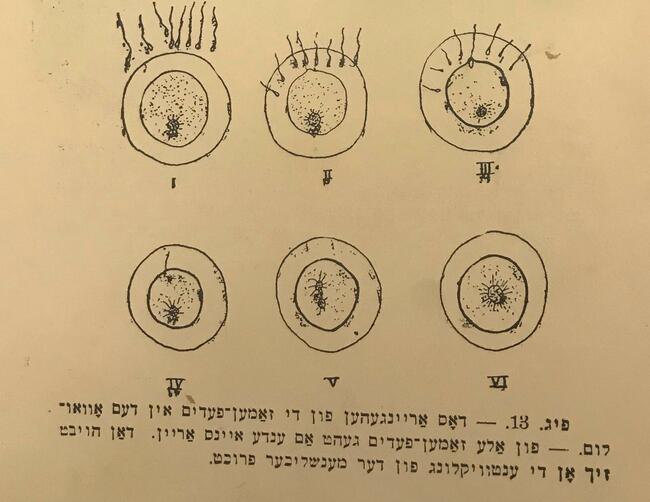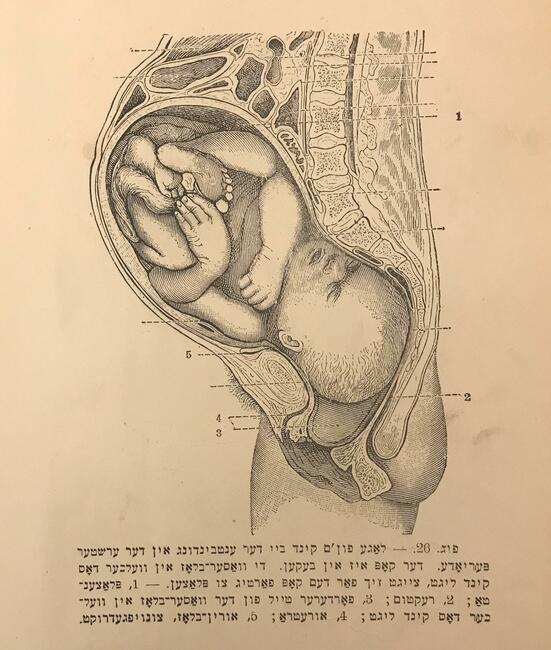Yiddish, Sex, and the Post Office
A Manual on Sexual Health for Jewish Immigrants in the Early Twentieth Century
The “fourth, improved edition” of a book by Dr. Ben-Zion Liber, dedicated as “a matone dem idishn folk” (a gift to the Jewish people), begins with a note, in English, titled “THIS BOOK AND THE POST OFFICE.” The note reads as follows:
In 1917 this book was suppressed by the Post Office. Although ostensibly it was declared nonmailable because it was regarded as obscene, the real reason was its radicalism in social and economic matters particularly as related to modern prostitution and venereal diseases and its advocacy of birth control. This was found out by the Division of Venereal Diseases of the United States Public Health Service which “put in—in vain—a strong plea for the value of the book in educating the public.” But after much correspondence and after the appearance of the author’s energetic protest in The New Republic of New York, the Solicitor of the Postmaster approved the mailing of the book, provided certain small, stupidly insignificant changes, indicated by the Solicitor, are made. It is evident that the much desired suppression of the book had become impossible; therefore these changes had to be insisted upon. But they were a poor excuse. As will be seen, the present edition has been printed in conformity with the order of the Post Office (Liber 5).

The book in question is Dos geshlekhts leben: a popular-visenshaftlikh bukh (Sexual Life: A Popular Science Book), and it contains a series of articles originally published by Liber’s magazine, Undzer gezunt (Our Health). These articles address the topics listed above and give general advice regarding sexual health, family planning, healthy eating, and more. Significantly, the book also contains diagrams and images of sex organs and fetal development, several of which were removed as part of the “small, stupidly insignificant changes” demanded by the Post Office.
The book may have been perceived by some as radical, but it was simply another day’s work for Dr. Ben-Zion Liber, who made a living communicating knowledge about physical and mental health to Yiddish-speaking Jewish communities. Born in Romania in 1875, Liber studied in Bucharest, Vienna, and Paris before arriving in the United States in 1904. In addition to producing his magazine and practicing public medicine, Liber worked with the Labor Zionist, Jewish anarchist, and Jewish Communist movements, contributed to various Yiddish newspapers, including the Fraye arbeter-shtime, Forverts, Varheyt, and Dos naye land, and published books in English and Yiddish on mental and physical health and hygiene. Later in life, he turned his attention to psychiatry, and he was a leading member of numerous prestigious psychiatric organizations and institutions.

Much of Liber’s writing on topics such as vegetarianism, venereal diseases, masturbation, and birth control was groundbreaking. Other elements of his work, such as his belief in eugenics, have not aged well. But what makes Liber’s career truly remarkable is his loyalty to the Yiddish-speaking public and the obvious responsibility he felt to better inform that public. Most of the information in Sexual Life was already available to readers of languages such as English and French. Liber did not even grow up speaking Yiddish. He decided to learn the language only after moving to New York. In the forward to the third edition of Sexual Life, Liber writes, “Having landed in the middle of such a large Jewish community, I immediately decided to learn—what else?—the Yiddish language, in order to speak to and write for my people in such a way that they would truly understand me” (13) (author's translation).
Liber dedicated Sexual Life to the Jewish people in more ways than one. In a preface to the book, Dr. Maurice Fishman praises Liber for “[doing] so much and so well in the popularization of medical literature for the Jewish readers” (10). The fourth edition of the book also contains a bulletin released by the Department of Health, noting that, while “in most newspaper offices the words ‘syphilis’ and ‘gonorrhoea’ are still tabooed,” Liber’s journal, Undzer gezunt, published most of the Department’s announcements “in full,” and many patients approaching the Department of Health for much-needed advice regarding venereal diseases “came . . . in response to the publications of this health journal” (9).

Many Jewish immigrants to the United States in the early twentieth century were struggling to stay afloat in a sea of new information, new economic infrastructures, new political systems, and new languages. Liber realized that acclimation to public life in America was only half the battle and would amount to nothing if immigrants failed to get a handle on their private lives as well. Innovation would continue to propel forward the fields of physical and mental health, and someone needed to take Yiddish speakers along for the ride.
—Sophia Shoulson
Sources:
Liber, Ben-Zion. Dos geshlekhts leben: a populer-visenshaftlikh bukh. 4th ed., Rational Living, 1927, https://www.yiddishbookcenter.org/collections/yiddish-books/spb-nybc211718/lieber-ben- zion-dos-geshlekhts-leben-a-populer-visnshaftlikh-bukh-sexual-life-a.
---. “Dr. Liber and the Post Office.” The New Republic, vol. 20, no. 249, Aug. 1919, p. 61, https://babel.hathitrust.org/cgi/pt?id=uva.x002579572&view=1up&seq=70.
Sohn, Amy. “Risque and Radical: Benzion Liber’s X-Rated Yiddish Sex Guide.” JSTOR Daily, 17 Aug. 2016, https://daily.jstor.org/the-x-rated-yiddish-sex-guide/.
